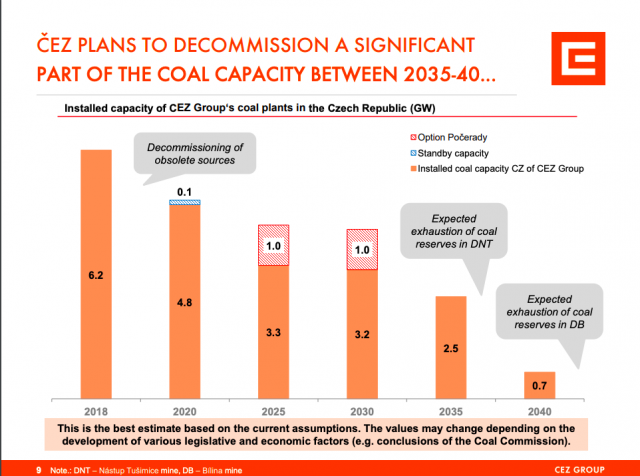08 October 2019
CEZ coal phase-out: too slow and selling its responsibility
By Jiří Jeřábek, Europe Beyond Coal campaign.
________________________________________________________________________________
In the beginning of October 2019, the Czech state-owned utility ČEZ published its plan to exit coal [1]. For the first time, the public, as well as investors, can see that the company plans to stop most of its coal power and heat production as late as 2040 and to close the last plant sometime in the 2040’s.
The presented plan is woefully inadequate. To save lives, transition to sustainable economics, protect communities and prevent the worst climate impacts, ČEZ needs to stop mining and burning coal by 2030 at the very latest [2]. But what ČEZ proposes with its new plan is close to business as usual, by keeping all newly retrofitted power plants operational until lignite reserves are exhausted, whilst selling off some of its coal assets to be operated by others. For the Bilina open-pit lignite mine this means an end date of 2035. The company even plans new coal capacity by building another CHP unit at the Melnik plant (307 MW thermal), though ČEZ is not openly admitting to this, and instead includes in their presentation the sentence: “partial modernization of the heating plant is planned after the old units are phased-out.”

Graph from the ČEZ presentation for a meeting with analysts and investors [1]
Selling not closing
The new plan confirms that ČEZ is sticking to its approach of ‘selling, and not closing’ coal plants. In addition to the news that it wants to sell two coal power plants in Poland (680 MW), ČEZ also confirms it will not cancel the sale of the biggest CO2 and mercury polluter in the Czech Republic, the Počerady coal power plant (1000 MW). Based on current arrangements the plant will be sold to the Sev.en group, owned by the notorious coal baron Pavel Tykač. This would enable the continued burning of coal in the Počerady plant for decades to come, as the aspiring new owner has a mining concession beyond 2050. Based on this, one can only conclude that ČEZ is trying to avoid its responsibility, and is instead putting profit before people’s health and the climate. ČEZ has done this before: in 2013, it sold the Chvaletice coal power plant to Tykač, leading to a significant increase in coal production (and emissions) and yet another permission to bend the rules on mercury pollution, which it can continue doing until 2027 [3].
The Počerady sale is highly controversial within the Czech Republic, with many politicians, environmental groups and minority shareholders of ČEZ voicing concerns and criticism. ČEZ still has the option to stop the sale until the end of the year. If it does not do so, the plant will change owners in 2024. ČEZ has argued that Počerady is already not economically viable and predicts the need for €100 to €240 million in investments until 2024. What is missing in the new plan is the consideration of a scenario, where the sale is canceled and Počerady is closed down; a move that could prevent an estimated 111 premature deaths, as last week’s study by Greenpeace revealed [4].
The Czech Coal Commission and what to expect next
The presented coal plan by ČEZ is not set in stone. We have witnessed the utility change its plans many times in the past. There are several factors at play that could result in changes. In fact, the plan makes economic assumptions about parameters it cannot control: the electricity and CO2 prices, as well as the costs of upgrades to meet the new air pollution limits (EU BATs/BREF) and the number of exemptions granted from those limits by local authorities. Additionally, the newly established Czech Coal Commission will present its recommendations for a national coal phase-out by September 2020, which could and should change this slow, uninspired course of action that ČEZ recently revealed to the world. In the meantime, we recommend to ČEZ to toss this plan to the bin, go back to the drawing board and come up with a 2030 coal exit scenario, which is what our climate and our health so desperately need.
- https://www.cez.cz/edee/content/file-s/pro-investory/informacni-povinnost-emitenta/2019-10/cez-031-2019_en_coal_energy_in_czechia.pdf
- https://climateanalytics.org/media/report_coal_phase_out_2019.pdf
- http://www.hnutiduha.cz/aktualne/elektrarna-pocerady-je-nejvetsi-znecistovatel-v-cr-chvaletice-zvysily-znecisteni-o-43
- https://www.greenpeace.org/czech/tiskova-zprava/4482/elektrarna-pocerady-predcasne-zabije-rocne-111-lidi-a-1000-zasahne-nadlimitnim-spadem-rtuti/
